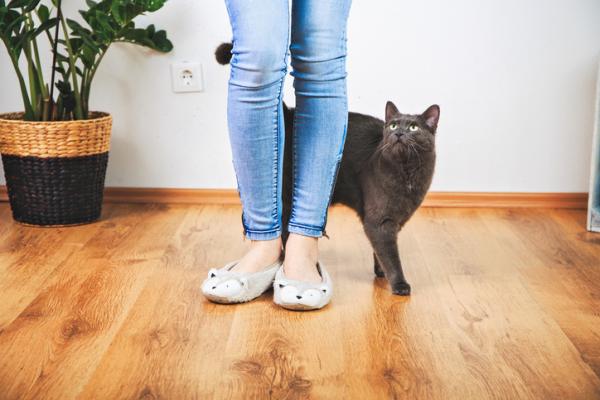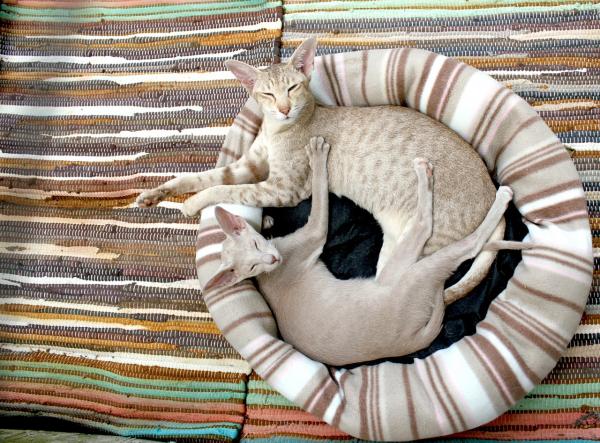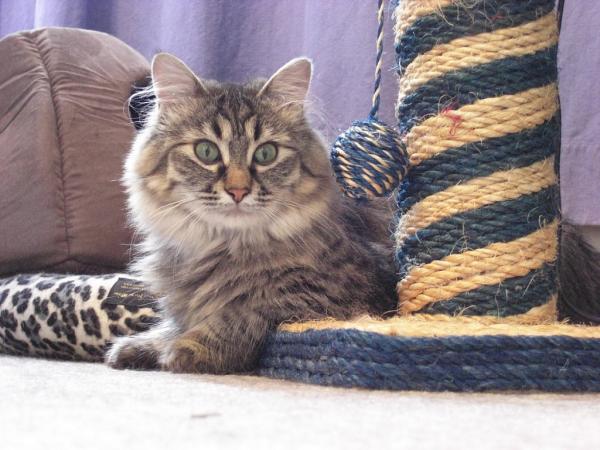Why does my cat cry when I leave?

Although the myth tells us that cats are very independent animals, the truth is that, like dogs, they can express displeasure, anxiety or grief in our absence. The meows or crying when we leave home and leave them alone they can appear in cats of any age.
In this article, we are going to explain why the cat cries when we leave and what we can do so that this situation does not occur, always bearing in mind that the first thing is discard some veterinary pathology, because the recurring meows may be indicating some discomfort.
The closed doors
As cat keepers, we have certainly observed the animosity that cats often show before closed doors, whether at home or at cupboards or cupboards. To the cat he likes to be able to explore for everything it considers its territory, without being prevented from entering any area. It is therefore common for cats to stalk intensely in front of a door.
They will be quiet as soon as we open it and, if they have left or entered some place, they will immediately return to meowing so that we allow them to enter again. If we live in a safe place so that our cat has access to the outside, the gatera It will be a good solution that will allow you to enter and exit freely.
But in buildings this is not going to be possible and such a situation can explain why the cat cries when we leave, because it will feel that it stays, in a certain way, “caught”, so that it can not satisfy its exploratory needs. When we leave the house and leave our cat inside, closing the door, it will manifest its discomfort meowing.
The cat does not want to be alone
It could be the case that the explanation why our cat cries when we leave is simply that he does not want to be alone. The cat he does not know we’re going to go back nor can he control our time of absence, hence he can cry when he detects that we are going to leave the house, which is quite simple, since we usually repeat the same routines as fitting ourselves, taking a purse, combing our hair, etc.
Although there are no studies that show separation anxiety occurs in cats, there are also those who discard it, for that reason, if we believe that may be the case of our cat, it may be helpful to accustom it to our departures gradually, that is, starting by absenting ourselves for a short period of time, which we will gradually increase in order that our cat understands that we are going to return.
This adaptation is not always possible because many cat caretakers will have to be absent many hours from the first moment, for example for work reasons. In these cases we can consider the possibility of adoptnot one, but two cats (or more, depending on our circumstances) if we are sure that our current feline has been properly socialized.
A companion cat will not feel alone and it will be rare for him to cry during our absence. We must raise this question before the adoption, in order to collect the cats together. If we already have one and want to introduce another, it is likely that we should follow some guidelines so that the adaptation is done with minimum stress for all.
We must also bear in mind that cats, before living together, should be tested for immunodeficiency and feline leukemia, because they are contagious diseases among them for which there is no cure. If we observe our cat truly anxious or stressed when we leave home we should contact a feline behavior specialist, such as a veterinarian with the appropriate training or a ethologist.

Basic needs covered
Other times it is explained why a cat cries when we go by a lack in what for him are his basic needs, such as food, water or sandbox. If our cat realizes that we are going to leave and has any of these needs, it is normal to cry to get our attention.
So before leaving, especially if we are going to be absent for several hours, we must make sure that we have clean and fresh water, of food and a clean sandbox, because there are cats that refuse to use it if they consider it too dirty. Also, a cat with a full stomach is more likely to nap, noticing our absence less. We will see other tricks in the following sections.
Boredom
Sometimes cats cry or howl when they are alone out of boredom. As we have said for the case of loneliness, having more than one cat is difficult to produce this situation but, if we are facing a single cat why the cat cries when we leave can be explained for this reason.
To counteract it, if increasing the family is not viable, we can introduce improvements in the house, which is known as environmental enrichment. This consists in offering the cat different entertainments in which he can spend his energy, avoiding, in this way, boredom and frustration. This point will be especially important for cats that live indoors and in small places.
Some ideas to improve the environment include:
- Scrapers, there are many types and heights and include games and different textures. We can find a wide variety in the market but we can also make them ourselves if we are a little skilled, using simple materials such as cardboard boxes, wood or rope.
- Different heights that we can achieve with just combining shelves, because cats love to control from the heights.
- Interactive toys that the cat has to manipulate to obtain rewards (if it is food we have to discount it from its daily ration to avoid problems of overweight). Like the scrapers, we can find several models for sale, but we can also make them in a homemade way with a plastic bottle or a cardboard box to which we will practice different holes for which the prizes can come out according to the cat I move them.

Recommendations for single cats
We have already seen in previous sections why a cat cries when we leave. Now we will expose some recommendations to avoid it. They are the following:
- If we can choose our departure time, we should be better off in the period when we know that our cat is more likely to be sleeping.
- Before leaving, it’s worth spending a few minutes playing or mimes. A tired and quiet cat is more likely to spend the next few hours sleeping instead of crying.
- Providing food before leaving also increases the likelihood that our cat is ready to sleep on a full stomach, as we have said.
- We can also reserve new toys to give you right before our departure. If we can awaken his interest, he will not be so aware of our absence. We do not need to buy something new every day, but we can store and retrieve toys or make them in a simple way, like a ball with aluminum foil or simply a box.
- We can try to leave music, radio or even television. Some animals like this “company”.
- We have to make sure we leave him clean water, food and sand, as well as his favorite accessible toys.
- We must control that the doors of the interior of the house remain open to avoid that our cat is frustrated and cries when wanting to enter or leave somewhere. We also have to keep the cabinets tightly closed to prevent it from entering and being locked up.
If you want to read more articles similar to Why does my cat cry when I leave?, we recommend that you enter in our Curiosities section of the animal world.


